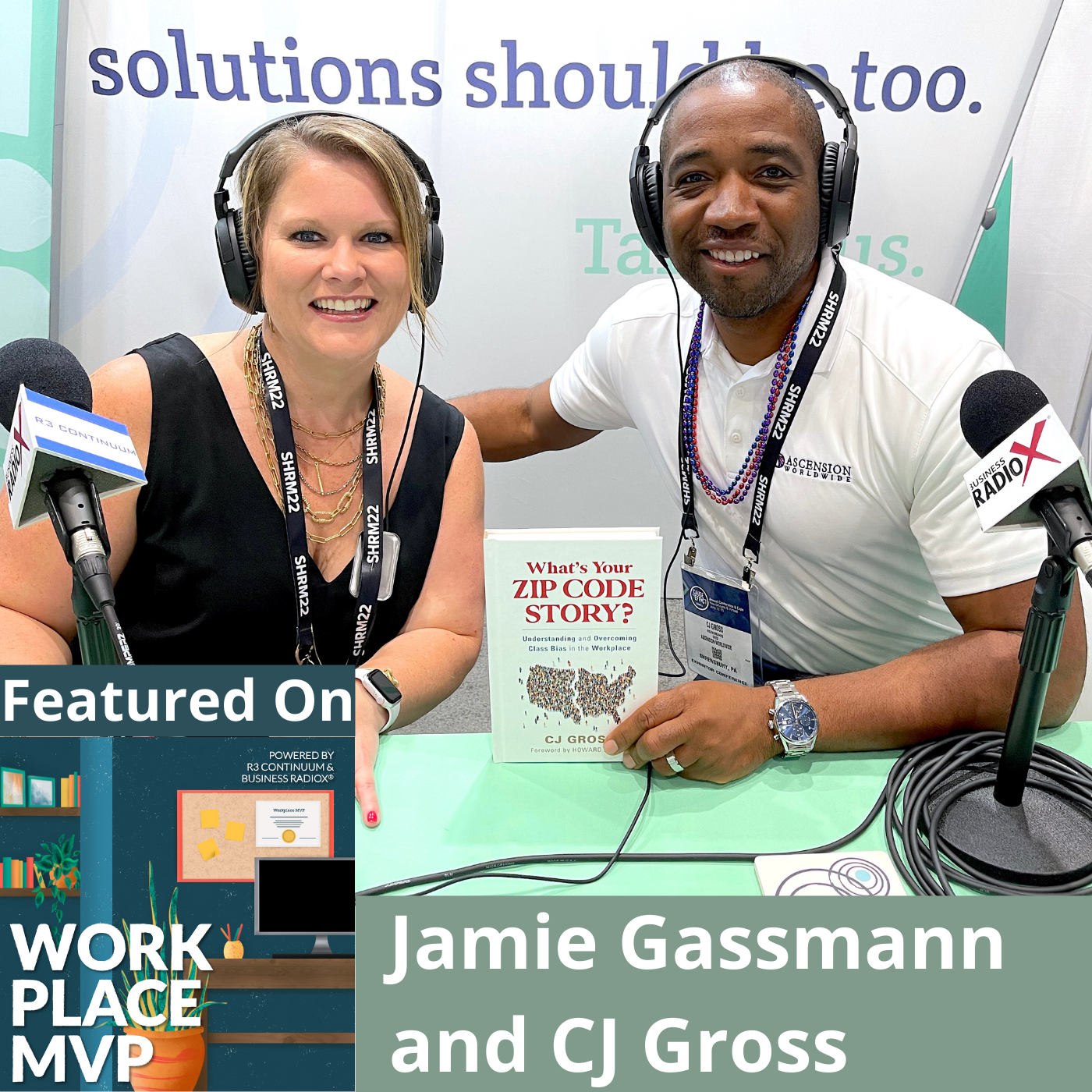
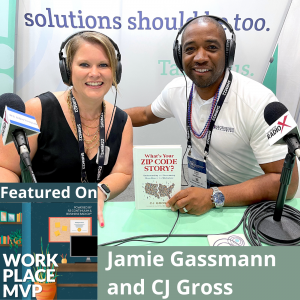
Workplace MVP LIVE from SHRM 2022: CJ Gross, Ascension Worldwide
CJ Gross, Founder and CEO of Ascension Worldwide, is the author of the newly released book, What’s Your Zip Code Story? CJ joined host Jamie Gassmann live from SHRM 2022 and discussed the book’s focus on our own personal upbringing and the class biases that unfold from our individual experiences. They also covered his career journey, his presentation at SHRM in 2019, understanding others’ stories, the new sport he’s taken up, and much more.
Workplace MVP is underwritten and presented by R3 Continuum and produced by the Minneapolis-St.Paul Studio of Business RadioX®.
This show was originally broadcast live from the 2022 SHRM Annual Conference held at the New Orleans Convention Center in New Orleans, Louisiana.
Ascension Worldwide
Ascension Worldwide is a full-service minority-owned consulting firm committed to helping clients achieve workplace inclusion, employee and client diversity, and innovative growth opportunities beyond their imagination. We are a global company that utilizes Blue Ocean strategies, quantitative and qualitative analysis, internal analysis, master-minding, and other innovative techniques to support exponential growth in companies while providing specialized target business consulting services that bridge the gap in technology and human capital development.
Ascension Worldwide provides an array of services, including talent management, leadership development, diversity, inclusion & equity consulting, strategic planning, process improvement, and other business management services.
Ascension Worldwide services clients from local and national non-profits, government agencies, as well as fortune 100 and 500 companies. We have experience in several industries including manufacturing, healthcare, construction management, engineering, law-enforcement, finance, education, insurance, retail, IT, and the military.
Company website | LinkedIn | Facebook |Twitter
CJ Gross, Founder and CEO, Ascension Worldwide
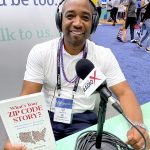
Christopher “CJ” Gross is an international organizational development consultant specializing in leadership development and Diversity and Inclusion. CJ has 17 years of experience as a certified Social + Emotional Intelligence coach, trainer, Keirsey Temperament professional, and executive coach, with additional expertise in organizational mediation. He also serves as a Business Management, Adjunct Faculty for the Community College of Baltimore County. CJ possesses the unique ability to uncover and resolve social issues that hinder employee performance and efficiency.
CJ’s book, What’s Your Zip Code Story?, is now available and was born out of a Ted Talk you can find here. 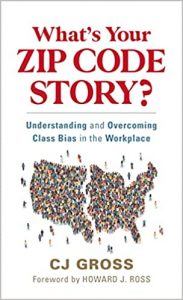
CJ started his career as a mechanical designer at General Electric (GE) where he learned to lay out mechanical designs and run calculations. At GE, he learned how effective companies run and the importance of employee relationships to a company’s success. After receiving multiple corrective preventive idea awards for employee development, CJ merged his engineering skills with his innate understanding of people, offering professional coaching and staff development to companies in need of improved performance and effectiveness.
CJ cultivated his diversity and Inclusion acumen through an intense training and coaching program from Cook Ross, an internationally known diversity and Inclusion consulting firm. The program included key concepts from Daniel Kahneman’s book, Thinking Fast and Thinking Slow, brain science theory, and life-changing deep-dive identity coaching. In addition, CJ has worked with domestic and international leaders from fortune 500 companies, nonprofits, and government agencies on their diversity and Inclusion strategies and initiatives. This training and experience enable CJ to help clients explore impactful strategies for identity, diversity, inclusion, equity and access from a unique vantage point.
CJ received a B. A. degree in organizational management from Ashford University through the Forbes Entrepreneurship Scholarship.
CJ has consulted with domestic and international companies including the United States Postal Service, Toyota, Turner Construction Company, Oracle, Arent Fox D.C, Washington Post, D.C. Child and Family Services, Morgan Stanley, Loyola University, Howard University: School of Social Work, Maryland Association of Community Service, Primerica, Delta Sigma Theta Sorority, Inc., Maryland-National Capital Parks and Planning Commission, Maryland Department of Juvenile Services, the District of Columbia-Metropolitan Police Department, Penn State and others.
CJ has been featured in the Washington Post, the Washington Informer Newspaper, East of the River Newspaper, Diamonds Xcel Magazine, the Baltimore Examiner, and on the Tom Joyner Show, the Audrey Chapman Show, DCTV Cable, WPGC 95.5 FM, WOL 1450 AM, WUSA 9, WBAL-TV, and FOX45.
He has published three other books including How to Get a Job in 90 Days, Seeds of Greatness, and The Parent Connection. Most recently, he has co-written an article titled, Design Thinking + D&I=Innovation.
About Workplace MVP
Every day, around the world, organizations of all sizes face disruptive events and situations. Within those workplaces are everyday heroes in human resources, risk management, security, business continuity, and the C-suite. They don’t call themselves heroes though. On the contrary, they simply show up every day, laboring for the well-being of employees in their care, readying the workplace for and planning responses to disruption. This show, Workplace MVP, confers on these heroes the designation they deserve, Workplace MVP (Most Valuable Professionals), and gives them the forum to tell their story. As you hear their experiences, you will learn first-hand, real-life approaches to readying the workplace, responses to crisis situations, and overcoming challenges of disruption. Visit our show archive here.
Workplace MVP Host Jamie Gassmann
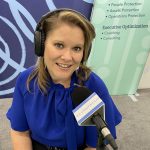
In addition to serving as the host to the Workplace MVP podcast, Jamie Gassmann is the Director of Marketing at R3 Continuum (R3c). Collectively, she has more than fourteen years of marketing experience. Across her tenure, she has experience working in and with various industries including banking, real estate, retail, crisis management, insurance, business continuity, and more. She holds a Bachelor of Science Degree in Mass Communications with special interest in Advertising and Public Relations and a Master of Business Administration from Paseka School of Business, Minnesota State University.
R3 Continuum
R3 Continuum is a global leader in workplace behavioral health and security solutions. R3c helps ensure the psychological and physical safety of organizations and their people in today’s ever-changing and often unpredictable world. Through their continuum of tailored solutions, including evaluations, crisis response, executive optimization, protective services, and more, they help organizations maintain and cultivate a workplace of wellbeing so that their people can thrive. Learn more about R3c at www.r3c.com.
Company website | LinkedIn | Facebook | Twitter
TRANSCRIPT
Intro: [00:00:03] Broadcasting live from SHRM 2022 at the New Orleans Convention Center, it’s time for Workplace MVP. Brought to you by R3 Continuum, a global leader in helping workplaces thrive during disruptive times. Now, here’s your host.
Jamie Gassmann: [00:00:20] Hi, everyone. Coming to you from SHRM 2022 Exhibit Hall, I am your host, Jamie Gassmann. And we are in our show sponsor’s booth, R3 Continuum. And joining me is CJ Gross from Ascension Worldwide. Welcome to the show, CJ.
CJ Gross: [00:00:35] Hey, Jamie. Thank you so much for having me. I’m very excited about today, really, at SHRM. It’s awesome kickoff here and I’m really excited about the book.
Jamie Gassmann: [00:00:44] Yeah. And I know you’ve got your book here. But before we dive into that, tell me a little bit about your background. Tell me a little bit about your journey so far in your HR career that led to you writing the book.
CJ Gross: [00:00:54] Yeah. Absolutely. So, I’m actually not in HR. My background is in engineering. And I worked for General Electric for about eight years, and I learned lots of information about how leadership happens in a healthy and productive way by things that didn’t happen and things that did happen while I was at General Electric.
CJ Gross: [00:01:17] From there, I moved into consulting work. I did leadership development for the last 20 years. And after a lot of work in diversity, equity, inclusion, I realized that it needed to be done differently. So, I actually brought my background in engineering as a different approach to talk about diversity, equity, and inclusion. Because people, really honestly, they’re tired of talking about it in the way that we’ve been talking about it. In some cases it’s very polarized and in other cases it’s exclusive to certain groups. And things don’t always change in organizations as we talk about these topics.
Jamie Gassmann: [00:01:54] Yeah. And so, you wrote a book and I know you have this book. It’s sold out of the SHRM Store.
CJ Gross: [00:02:01] Yeah. It sold out.
Jamie Gassmann: [00:02:01] What’s Your Zip Code Story?
CJ Gross: [00:02:03] In a few hours, it’s sold out.
Jamie Gassmann: [00:02:03] I know. You got to be absolutely so proud of that. That’s amazing. And I want to dive into hearing about the book. Because when we’re talking before we got on the microphone, it was just so interesting when you said you were covering some of the biases that this book kind of talks about. Let’s dive into it. Tell me a little bit about what is your book about. And what does an HR leader learn from this or a business leader? Because I think it could be really anybody that’s leading an organization. Let’s talk a little bit about what’s inside there.
CJ Gross: [00:02:32] Sure. So, the book is called What’s Your Zip Code Story? And that concept is about not just where you grew up, but how you grew up, the sights and sounds outside of your door, the conversations around the dinner table, the conversations with your parents. All those things influence and flavor the way you see the world and, ultimately, the way you build relationships in the workplace, mentorship, build teams, hire people, and really shapes the lens in which you see the world and how you connect to other people.
CJ Gross: [00:03:04] The second part of it is about class bias. So, they’re really connected there, the two components. Now, the class bias piece is something that we’re really not diving into in the diversity, equity, and inclusion conversation. So, that component came out of a presentation I did for SHRM 2019 Inclusion Conference. They put me on the very last day, the very last hour when people are leaving the conference. I was like, “No one’s going to show up.” And to my surprise, one person walked through the door. So, I was like, “Okay, I’m not alone.” And then, 60 other people walked through the door.
Jamie Gassmann: [00:03:40] Nice.
CJ Gross: [00:03:41] And not only did they stay, they wouldn’t leave. The tech person had to pull the microphone because people were staying in there, they were crying. They were weeping because they not experienced a place where they can share their own – what we call – your zip code story. And that’s really about your uniqueness and it goes beyond just your identity that we can see.
CJ Gross: [00:04:07] And so, this book really touches on those two components, your zip code story – what your background is, where you’re from – and also the eight class biases that we just talked about. And how does one expand their zip code story to mitigate those biases in the workplace.
Jamie Gassmann: [00:04:26] Yeah. So, fascinating. Because, really, we all have so many different experiences across our life from childhood on up. You know, I’m an army brat. When you look at me, you don’t know that I’m an army brat. You would never know that. But I tell you it – honestly, just sharing this as a conversation – one of the things that I hear is, “Was it hard to grow up moving a lot? That’s awful.” I’m like, “Really? That shaped who I am. That’s change management right there.”
CJ Gross: [00:04:53] It’s like a super power. It’s like a super power.
Jamie Gassmann: [00:04:53] Right. Yes. I’m like, “I actually thrive in that.” It’s actually a powerful thing. You know, you could look at it is a negative, but we never did. And so, it’s just interesting because when you think about that, everybody grows up a little different and you automatically draw an assumption about the person when you hear it.
CJ Gross: [00:05:12] The story.
Jamie Gassmann: [00:05:12] That’s so fascinating. So, how do you embrace those stories? How do you pull those stories out of your employees? Because, you know, as a leader, that can be challenging, right?
CJ Gross: [00:05:23] It is challenging across the board for all diversity conversations, not for every single person, but for many people. Because the first thing they think about is diversity, “If I’m not a part of a certain diverse culture or identity, then is this for me?” So, the first thing I tell the leaders is, “First, know your own zip code story.” It’s the first thing. Understanding your background and how that shapes the way you see the world, it’s the first thing.
CJ Gross: [00:05:49] The second thing is to share your background story, share your upbringing, share your experiences, and things that have made you who you are. And through that, you are then the leader which opens up the door for other people in different backgrounds to share their story. And then, you can lean into that story.
CJ Gross: [00:06:08] Honestly, you don’t even have to go down the road of talking about all the diversity conversations that we know. Not to say those aren’t important. But if you really want to create psychological safety, then you share your story. And you can also share the story about something about yourself that people wouldn’t know just by looking at you.
CJ Gross: [00:06:27] Because you may now be the leader sitting up high in the organization and people think, “Oh. They’ve been there. They had it easy. They’re privileged.” It’s what we hear a lot. It’s not to say that people are not privileged. But when people really know your story, you come down to earth, it’s more authentic. There is a bridge of connection there that allows people to connect with you in a different way.
CJ Gross: [00:06:49] And when you share your zip code story as a leader, you create this psychological safety which allows other people to lean in and share theirs. And it leads to better performance, lowers turnover, and you get more creativity out of those individuals, which ultimately lead to increased market share, which every company wants.
Jamie Gassmann: [00:07:12] Absolutely. Well, when I hear you talking, it makes me think you humanize yourself.
CJ Gross: [00:07:19] Yes.
Jamie Gassmann: [00:07:19] You’re a human just like your people. You give them an opportunity to relate with you at that human level.
CJ Gross: [00:07:25] It makes you relatable.
Jamie Gassmann: [00:07:27] And it allows you that opportunity, really, to be an authentic person, authentic leader. You know, at different episodes, we talk a lot about how do you create that opportunity of being vulnerable in front of your team or bringing your true self to work, that’s what I think about when I think about your book in this whole What is Your Zip Code Story? That’s amazing. Fascinating. So, if somebody wanted to get a copy of your book – I understand it’s on Amazon.
CJ Gross: [00:07:56] It’s on Amazon.
Jamie Gassmann: [00:07:57] But how do they get a copy of it now that it’s sold out at SHRM? You’ve got to let the rest of those that didn’t get to the bookstore fast enough know.
CJ Gross: [00:08:04] Well, don’t tell anyone, just between you and I, I had a private stash that I had in my book bag that I just took over there earlier before I came here. So, there’s probably about 20 books left now. So, we already sold out the first hundred in less than two hours. And now, we have, like, 20 something left, so that’s not going to last.
Jamie Gassmann: [00:08:27] So, anybody not getting it at SHRM who missed out –
CJ Gross: [00:08:32] They can go and find it on Amazon and everywhere else books are sold. And also the book, before we came a book – I was a about to say a Broadway play. But it wasn’t.
Jamie Gassmann: [00:08:40] It was a great play.
CJ Gross: [00:08:41] I know, right? It was an awesome play. What is Your Zip Code Story?
Jamie Gassmann: [00:08:43] I can see it. I think we could write the script right now.
CJ Gross: [00:08:46] But it was a TED Talk.
Jamie Gassmann: [00:08:46] So, you’re singing part to it?
CJ Gross: [00:08:48] Yeah. I wouldn’t do it. You wouldn’t want me to do it.
Jamie Gassmann: [00:08:50] You wouldn’t want me either. But a TED Talk, that’s really cool.
CJ Gross: [00:08:53] It turned into a TED Talk. And from the TED Talk, it turned into a book, and it just came out. And, actually, this is the third week that it’s been out. And next month, I’m actually doing a book talk and some work around this concept in England, London.
Jamie Gassmann: [00:09:13] Great. So, if they want to see the schedule for that book tour, so if we have any international listeners, where could they find all this great information?
CJ Gross: [00:09:20] So, the information for the UK is not on the website as of yet. It’s a good idea. I’ve been moving so fast. But they can go to either one of my websites which is, cjgrosstalks.com or ascensionworldwide.com.
Jamie Gassmann: [00:09:36] Wonderful. They’ll find you.
CJ Gross: [00:09:37] Type in CJ Gross, and I will pop up, you’ll find my LinkedIn. One of the things that I do that I want to mention about – well, it’s on LinkedIn – what makes this work for me unique is, as you look at me, I’m a person of color, I’m a male. But the zip code story, what people wouldn’t know, is that I do motocross.
Jamie Gassmann: [00:10:02] I love that. I should have asked you, what’s your zip code story?
CJ Gross: [00:10:06] It’s too much to talk about.
Jamie Gassmann: [00:10:07] I kept sitting here going, “What’s my zip code story?” Like, I’m listening to you going, “Gosh. You know, what would mine look like?” So, you do motocross?
CJ Gross: [00:10:14] I do motocross. I am learning Spanish, [Foreign language]. I am learning to surf. So, there’s so many things that I’m doing to expand my zip code. That’s what the book is also about, is expanding your zip code story around people, places, and things. I’ve taken up golf. I’ve joined the Rotary Club, I did a presentation there – was it last week or yesterday? I couldn’t remember. I’m so busy.
CJ Gross: [00:10:37] But the point is, when people read the book, yes, you should understand your zip code story. You should understand other people’s zip code story. But you should also expand your zip code story. Because from there, two things happen. One, you get to see what another person experiences. The other thing is you get to learn new cool things about yourself.
CJ Gross: [00:10:56] Like, I would have never thought I would have been into motocross. I do skeet shooting. I started swimming, so I scuba dive now. Like, all of this is within the last five years, though, and I won’t tell you how old I am. But most people would not expand their zip code because they think, “I’m too old. I’m too young.”
Jamie Gassmann: [00:11:13] You’re never too told.
CJ Gross: [00:11:15] “I’m this. I’m that.” But what this does is allows you a doorway to expand who you are. And, really, this is a new competency for the future of leadership. So, you can look diverse, but if you don’t have a mindset for diversity – traveling does that as well – you’re going to be out of a job. And it may not be today, but it will be tomorrow. And so, the goal is to expand your zip code story by doing different things and different experiences.
Jamie Gassmann: [00:11:44] I love that. And, honestly, travel can do that for you. And don’t just go to Senor Frogs. Like, seriously, go off the beaten path.
CJ Gross: [00:11:50] Go where?
Jamie Gassmann: [00:11:51] Don’t just go to Senor Frog’s if you’re in Mexico. Go to Napa, just the tourist traps. But really, really experience the culture of where you’re at and embrace it.
CJ Gross: [00:12:01] I want to tell you a quick story if we have time.
Jamie Gassmann: [00:12:03] We do. Absolutely. As much time as you want. We can talk here all day.
CJ Gross: [00:12:08] So, I went to Nicaragua. And in order to get to Nicaragua, I had to fly into Costa Rica. We’re at Costa Rica, we took a cab to the border. And from the border of Costa Rica, we had to walk – I don’t know – a-quarter-of-a-mile to Nicaragua. And on that passage, I had to show my passport, like, six or seven different times. And I remember coming back home and complaining. I was like, “You know I had to show my passport?” And then, we had to take a cab to the port. And at the port, we took a water taxi to an island. And then, I took another taxi.
CJ Gross: [00:12:54] So, not to mention all of those things, when people talk about, you know, inclusion or a privilege, you might say, “Oh. This is a person, a person of color, they don’t have privilege like other people.” But just having a U.S. passport is a privilege that people don’t think about. And when I gained that experience by actually putting myself in that situation and not really speaking the language – I only speak, like, 12 words of Spanish – but I was able to get around and get fed.
CJ Gross: [00:13:22] But the thing is, when I came back to the States and for my friends or colleagues who English is their second language, I had a whole nother appreciation for their experience. And it doesn’t mean I agree with everything that’s set out there in politics and all that, but what it means is that I can now have empathy.
CJ Gross: [00:13:41] You know, Brene Brown talks a lot about that, having empathy. I can now have empathy from someone who has a different culture and has a different passport. The same thing with women’s rights. You know, there’s lots of things that I learned about women that I had to be made aware of. For example, we asked people, “What’s the number one bias you have flying on an airplane?” And a lot of people say different things, we won’t go into that.
Jamie Gassmann: [00:14:07] I had to think about that.
CJ Gross: [00:14:10] Babies, number one.
Jamie Gassmann: [00:14:13] Sitting next to a crying baby?
CJ Gross: [00:14:15] Yes.
Jamie Gassmann: [00:14:15] Oh. See, I’m a mother. I get it.
CJ Gross: [00:14:18] Yeah. They have biases against other kids, but not theirs because they left their kids at home. But 25 percent of women said, “I want to sit next to someone who is the same gender.” And I made a comment that showed my awareness at the time. I said, “Whoa. What’s wrong with guys?” And they said, “Well, you’ve probably never been a woman on an airplane.” I was like, “You know I haven’t, right?” But women are assaulted at times on the airplane when they go to sleep or people bother. And I was like, “That’s never happened to me in that way because I’m not a woman.”
CJ Gross: [00:14:50] But hearing from women in that way created a greater empathy for their experience. So then, when you look at engineering, where I come from, where there are not a lot of women or people of color, when a woman says something, a person of color says something, I can relate with that. But, now, what it means to be the only woman in a male dominated environment opens my eyes because I’ve heard something. Or if I reverse engineer it, and I am the only.
CJ Gross: [00:15:17] So, being the only for a leader is important because if you’re trying to support someone – we always say this in our organization – you can’t take someone where you’re not willing to go yourself or you have never been yourself. So, if you’ve never been the only, if you haven’t interviewed people and understand what that’s like, it’s hard to empathize. And, although, we want to create pay equity and all those other initiatives, it’s going to fall short because people don’t have that experience.
Jamie Gassmann: [00:15:45] That’s so interesting. I would have never thought that on the airplane, and I travel quite a bit for work.
CJ Gross: [00:15:53] When you get on an airplane –
Jamie Gassmann: [00:15:54] I’m never going to get that thought out of my head now, CJ.
CJ Gross: [00:15:56] … you automatically assess people up and down and you create a story and you’re like, “Mm-hm. Not that guy. Not that woman.”
Jamie Gassmann: [00:16:03] You do. What they’re wearing. It might be what they’re looking like. I mean, if they look like they just rolled out of bed, and grabbed their pillow and their blankie, and brought it to the airport with them, I’m going, “Oh, boy.”
CJ Gross: [00:16:14] “I’m not going to sit next to them, they smell funny.”
Jamie Gassmann: [00:16:18] “They didn’t shower this morning, obviously. Like, I hope they’re not next to me.” And it was next to you, right? That’s so interesting. But we all do it. And you do it everywhere you go and everywhere you’re at, and you don’t even realize sometimes that you’re even doing it. That’s so interesting. Now, I’m going to be walking around going, “I wonder what their story is. What’s their zip code story?”
CJ Gross: [00:16:40] And that’s the hope for this book, is, it catches on and people go, “well, what’s their zip code story?” And they won’t just think about their brain is creating a story about them, but they actually lean in and lean past that bias conversation and say, “You know what? That person would never be good for this job because of this.”
CJ Gross: [00:17:02] Or here’s another one for women we hear is that, if you look like you’re of childbearing age – how does someone know? – people will not give you assignments that require travel. Because they’re thinking that, one, if you have kids, they’re thinking you may want to stay home with your kids. They didn’t ask.
Jamie Gassmann: [00:17:25] Do they do that to men?
CJ Gross: [00:17:30] No. That’s the zip code for it, because you don’t know that there are a lot of men that are actually playing the role. And so, just judging people in that way is exclusive. But, again, when we’re just talking about the normal topics of diversity, we’re missing out on a whole different conversation.
Jamie Gassmann: [00:17:50] So fascinating. Oh, my goodness. I think we’ll have to have another follow up on this. I think we could talk for hours on that.
CJ Gross: [00:17:56] Yeah. Maybe I’ll come back tomorrow or something.
Jamie Gassmann: [00:17:57] There we go. We’ll do two. Why not? It was a piggyback. We’ll talk about interviewing. Like, how do you use the zip code story in interview?
CJ Gross: [00:18:06] Stay tuned. We’ll talk tomorrow about it.
Jamie Gassmann: [00:18:07] Stay tuned. There we go. So, if you are interested in checking out CJ’s book, which I highly recommend because it sounds super interesting and I think it’d be very beneficial to any business leader or HR leader out there, What’s Your Zip Code Story?, definitely check out amazon.com. Very cool. Thanks so much, C.J. It’s been great talking with you.
CJ Gross: [00:18:31] Thank you. This has been awesome.
Outro: [00:18:31] Thank you for joining us on Workplace MVP. R3 Continuum is a proud sponsor of this show, and is delighted to celebrate most valuable professionals who work diligently to secure safe workplaces where employees can thrive.














